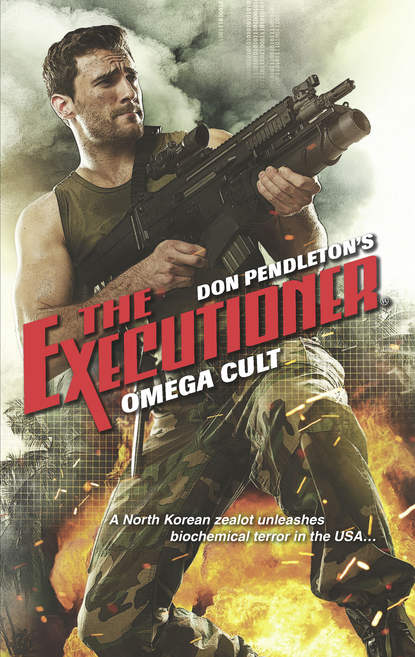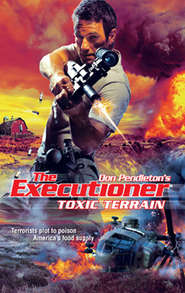По всем вопросам обращайтесь на: info@litportal.ru
(©) 2003-2025.
✖
Omega Cult
Автор
Год написания книги
2019
Настройки чтения
Размер шрифта
Высота строк
Поля
The second bag held Bolan’s sidearms and the holsters to support them: a DE44CA—Desert Eagle .44 Magnum California—the Israeli pistol’s only model certified for sale inside the Golden State, and a Beretta 93-R selective-fire handgun. While deemed obsolete by military purists, last manufactured in 1993, the 93-R had served Bolan well in the past. Included in the second bag were two dozen 20-round Beretta magazines and an equal number of 8-round mags for the big Desert Eagle.
By the time he left San Bruno, westbound into San Francisco proper, Bolan was dressed to kill with the Beretta in fast-draw armpit leather, gun beneath his left arm, two spare magazines beneath his right. The other weapons rode behind him on the Passat’s floorboards, within arm’s reach of the driver’s seat. If he was stopped by the police—unlikely, but an outside possibility—his driver’s license from Virginia, made out to “Matthew Cooper,” would withstand a visual inspection and a check for warrants through the FBI’s National Crime Information Center. If the probe went any further, his employment record as a sales rep for a pharmaceutical concern in Arlington was also verifiable by phone, routed to Stony Man.
The point, of course, was not to be discovered, stopped or questioned by authorities.
Right now, though, Bolan’s problem was a church of sorts, allegedly connected to the massacres committed by three of its members in Los Angeles, 347 miles southeast of San Francisco. That, and the alleged link between Lee Jay-hyun’s Omega Congregation and a rumored spy for North Korea.
Bolan personally had no quarrel with any doctrine, sect or cult until they crossed the line belief into criminal action. No churchgoer himself, he had a broad view of morality as such and privately disagreed with many statutes punishing crimes the law labeled malum prohibitum—“wrong” simply because they were prohibited—rather than malum in se—“evil in itself.” He did not disapprove of gambling, prostitution and the like for their own sake, but cracked down hard wherever victimless crimes were employed by evil men to fatten felonious coffers and promote more sinister activities: extortion, murder, human trafficking, enslavement of the innocent with drugs or terrorism.
And when Bolan drew a line, it was a dead line in the classic Old West sense.
His enemies who crossed it generally wound up dead.
Ashbury Heights, San Francisco
AMERICAN HEADQUARTERS FOR the Omega Congregation stood on Delmar Street, west of Buena Vista Park. Stately homes in the neighborhood listed with Realtors for a median price of $2.6 million and normally sold for an average $1.2 million after various negotiations, light-years away from nearby Haight-Ashbury with its 1967 Summer of Love reputation and its swift decline thereafter into hard drugs, occupation by the outlaw biker gangs and frequent raids by the police and Feds. The 1970s brought renovations and an unexpected renaissance of standup comedy, but “Hashbury” still lagged far behind its gentrified southern neighbor in terms of outward style and dependable property values.
Ashbury Heights, in short, had been the perfect place for Lee Jay-hyun to plant the seeds of the Omega Congregation and watch them bloom.
Not that his neighbors were receptive to a new Eastern religion springing up among them, with the automatic stigma that attached to gurus, chanting, incense and the like. They had already watched the Hare Krishna movement from a cautious distance, noting its devolution from a peaceful group of peaceful supplicants in saffron robes into public charges of blackmail and extortion, embezzlement, even gunrunning and murder. And those were Hindus, members of a widespread, prominent religion in the East.
With that in mind, what were the WASPs of Ashbury supposed to make of a newfangled sect arriving in their midst full-blown, without a hint of warning from Korea?
Still, after a rocky start, most residents had made their peace with the Omega Congregation, noting that its members did not panhandle or proselytize on the streets or in malls, inflicting themselves upon strangers. No strange smells or noises emanated from their house on Delmar Street that would have sent property owners running to their pricey lawyers with a public nuisance claim. Police were never summoned to Lee’s address.
This day, a guest was closeted with Lee inside his third-floor office at the combination house and temple. Lee was seated in a high-backed swivel chair behind an elevated desk carved from jatoba—called “Brazilian cherry” in the States—extracted from the dwindling Amazonian rainforest. Facing him, his smaller chair designed to let Lee peer down his short nose at any visitors, sat Park Hae-sung.
“You came in through the back way?” Lee asked.
“As always,” Park replied.
“And took the usual precautions to avoid a tail?”
“Of course.”
Both knew that Park was subject to surveillance by a list of US law-enforcement agencies. So far, they hadn’t laid a glove on him, but that was not from lack of trying. Park assumed his phones were tapped, relying on bulk purchases of burner cells from Walmart that he deemed untraceable, routing his rare emails through an anonymous server based in Denmark. Whenever possible, he spoke to Lee in person, the most risky mode of all.
“My guess is that you wish to talk about Los Angeles,” Lee said.
“Indeed,” Park replied. “We need to follow up with more attacks.”
“I’ve spoken to my master,” Lee replied.
“You actually call him master?” Park cut in, a challenge in his tone.
“It’s only fitting for a man in his position,” Lee replied.”
“If you say so, comrade.”
“I’ve told you more than once, I’m not a communist,” Lee said.
“And yet, you’re helping us. You and your holy master.”
“It is unwise to mock a man in his own house,” Lee cautioned Park.
“No mockery intended, I assure you. You must understand that I was raised to treat religion—all religions—with the same disdain. Marx says they are the opiate of peasants, used by their true masters, the industrial elite, to hold them in positions of subservience.”
“If you wish to quote your manifesto, should I answer you with texts from the Bhagavad-Gītā?” Lee asked.
“Let us spare each other from that fruitless argument,” Park said, “and focus on our business together.”
“Very well. My primary soul is concerned about the heat resulting from the LA incidents. All three participants have been connected to the Omega Congregation, as you know.”
“And did we not expect that?” Park seemed disappointed by Lee’s answer. “It was planned to paint the three as infiltrators planted in your cult—”
“Our sect,” Lee said, correcting him.
“My most sincere apology.” Park’s contrition was nowhere evident in his demeanor or his voice. “Three infiltrators in your sect, planted by South Korea’s NIS.”
Park referred to the National Intelligence Service, initially launched as the Korean Central Intelligence Agency in 1961. It was renamed the Agency for National Security Planning twenty years later, finally switching to the NIS label in 1999 without revising much in its outlook or former methods of collecting information.
“That is one of Master Shin’s primary difficulties with the plan. Observers know the NIS has worked with the Omega Congregation time and time again. Why would they suddenly subvert us? Far more likely would be sabotage by your own agency.”
“Logic need not confuse the matter,” Park replied. “Perhaps the move was made by rogues within the NIS. Who knows? Who even cares? A bit of speculation in the Washington Inquirer and your master’s other news outlets should set the stage for what comes next.”
“And none of that shall happen without full approval from the primary soul, as you knew well enough when we began.”
“He was on amenable terms at that stage.”
“And he still may be, but the reaction to Los Angeles, although expected, has included calls in Congress for a full investigation of the Congregation. That jeopardizes my relationship to you, as well as your remaining in America.”
“We take precautions, do we not?” Park asked.
“And yet I hear from one of my people employed with San Francisco PD that federal agents are always watching you.”
“Which is exactly why we take precautions,” Park replied, sounding a trifle testy now.
“But risks are multiplied today. Nothing seems innocent, nothing coincidental, since the sarin was released.”
“You’re having second thoughts,” Park said. “Buyer’s remorse. That is unwise.”
“I hope that is not meant to be a threat,” Lee cautioned Park.
“Of course not, brother.”
“We are not brothers until you have joined the Congregation, Captain.”
“I do not use that title here,” Park said. “Hardly at all, in fact, except on ceremonial occasions in Pyongyang.”











